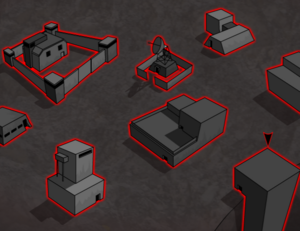Welcome to the Madness Combat Wiki!
"The Madness Combat Wiki aims to provide comprehensive and up-to-date information on the popular Flash animation series Madness Combat, including characters, weapons, and episodes. Our goal is to be the go-to source for all things Madness Combat, fostering a community of fans who can share their knowledge and enthusiasm for the series."
The Star Citizen Wiki is made by people like you! Be Bold and get started here!
local p = {} local args = {} local origArgs = {} local root
-- Returns a table containing the numbers of the arguments that exist -- for the specified prefix. For example, if the prefix was 'data', and -- 'data1', 'data2', and 'data5' exist, it would return {1, 2, 5}. local function getArgNums(prefix) local nums = {} for k, v in pairs(args) do local num = tostring(k):match('^' .. prefix .. '([1-9]%d*)$') if num then table.insert(nums, tonumber(num)) end end table.sort(nums) return nums end
local function addItem(itemArgs, root) local item = root:tag('div') item:addClass('template-statsbar__item')
if itemArgs.label then item :tag('div') :addClass('template-statsbar__label') :wikitext(itemArgs.label) :done() end
item :tag('div') :addClass('template-statsbar__data') :wikitext(itemArgs.data) :done()
if itemArgs.desc then item :tag('div') :addClass('template-statsbar__desc') :wikitext(itemArgs.desc) :done() end end
local function renderItems(root)
-- Gets the data argument numbers,
-- and renders them all in order using addItems.
local itemnums = getArgNums('data')
table.sort(itemnums)
for k, num in ipairs(itemnums) do
addItem({
label = args['label' .. tostring(num)],
data = args['data' .. tostring(num)],
desc = args['desc' .. tostring(num)],
},
root)
end
end
-- If the argument exists and isn't blank, add it to the argument table. -- Blank arguments are treated as nil to match the behaviour of ParserFunctions. local function preprocessSingleArg(argName) if origArgs[argName] and origArgs[argName] ~= then args[argName] = origArgs[argName] end end
-- Assign the parameters with the given prefixes to the args table, in order, in -- batches of the step size specified. This is to prevent references etc. from -- appearing in the wrong order. The prefixTable should be an array containing -- tables, each of which has two possible fields, a "prefix" string and a -- "depend" table. The function always parses parameters containing the "prefix" -- string, but only parses parameters in the "depend" table if the prefix -- parameter is present and non-blank. local function preprocessArgs(prefixTable, step) if type(prefixTable) ~= 'table' then error("Non-table value detected for the prefix table", 2) end if type(step) ~= 'number' then error("Invalid step value detected", 2) end
-- Get arguments without a number suffix, and check for bad input. for i,v in ipairs(prefixTable) do if type(v) ~= 'table' or type(v.prefix) ~= "string" or (v.depend and type(v.depend) ~= 'table') then error('Invalid input detected to preprocessArgs prefix table', 2) end preprocessSingleArg(v.prefix) -- Only parse the depend parameter if the prefix parameter is present -- and not blank. if args[v.prefix] and v.depend then for j, dependValue in ipairs(v.depend) do if type(dependValue) ~= 'string' then error('Invalid "depend" parameter value detected in preprocessArgs') end preprocessSingleArg(dependValue) end end end
-- Get arguments with number suffixes. local a = 1 -- Counter variable. local moreArgumentsExist = true while moreArgumentsExist == true do moreArgumentsExist = false for i = a, a + step - 1 do for j,v in ipairs(prefixTable) do local prefixArgName = v.prefix .. tostring(i) if origArgs[prefixArgName] then -- Do another loop if any arguments are found, even blank ones. moreArgumentsExist = true preprocessSingleArg(prefixArgName) end -- Process the depend table if the prefix argument is present -- and not blank, or we are processing "prefix1" and "prefix" is -- present and not blank, and if the depend table is present. if v.depend and (args[prefixArgName] or (i == 1 and args[v.prefix])) then for j,dependValue in ipairs(v.depend) do local dependArgName = dependValue .. tostring(i) preprocessSingleArg(dependArgName) end end end end a = a + step end end
local function parseDataParameters() preprocessSingleArg('id') preprocessArgs({ {prefix = 'label', depend = {'data'}}, {prefix = 'desc', depend = {'data'}}, }, 50) end
local function _statsbar() root = mw.html.create('div') root:addClass('template-statsbar')
renderItems(root)
if args.id then root:attr('id', 'statsbar-' .. args.id) end
return mw.getCurrentFrame():extensionTag{
name = 'templatestyles', args = { src = 'Module:Statsbar/styles.css' } } .. tostring(root) end
-- If called via #invoke, use the args passed into the invoking template. -- Otherwise, for testing purposes, assume args are being passed directly in. function p.statsbar(frame)
if frame == mw.getCurrentFrame() then
origArgs = frame:getParent().args else origArgs = frame end
parseDataParameters()
return _statsbar() end
-- For calling via #invoke within a template function p.statsbarTemplate(frame) origArgs = {} for k,v in pairs(frame.args) do origArgs[k] = mw.text.trim(v) end
parseDataParameters()
return _statsbar() end return p




























